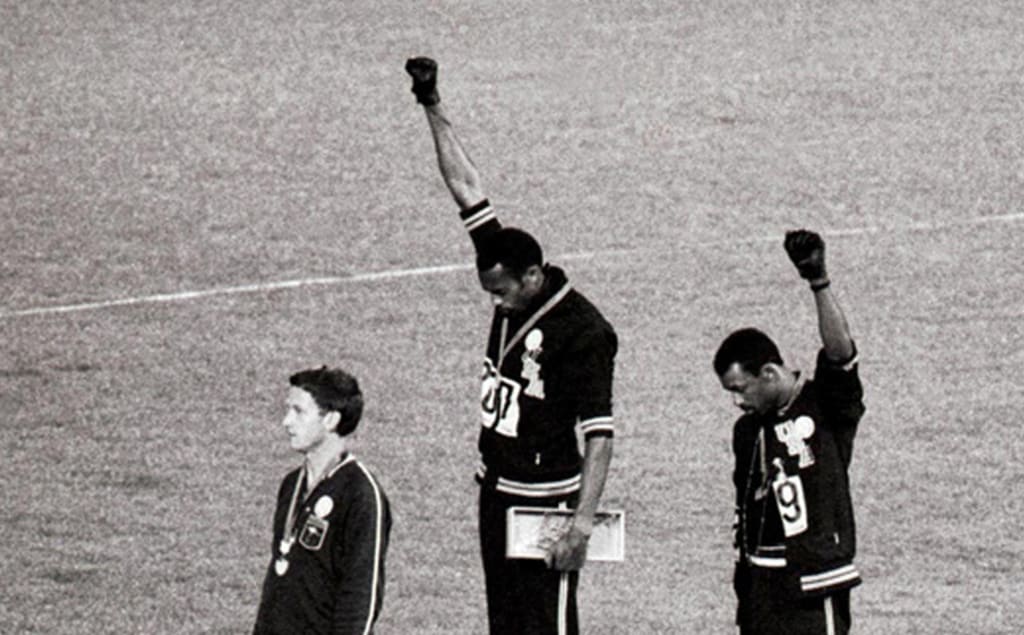The Man On The Left
A man who understood black live matter...as well.

I laid in my bed with tears streaming down my face. It has been an emotional week. Struck down by some seasonal bug or - shoutout to Covid19! - the plague of the moment, along with the never-ending lockdown, I found myself mostly bed-ridden this week as the fallout from the George Floyd murder gained and maintained worldwide traction.
There are so many soundbites and stories and anecdotes surrounding the BlackLivesMatter movement and with all the extra time I had on my hands, I have been reading many of them. There are raging black voices, pleading black voices, even dissenting black voices. There are raging white voices and pleading white voices. In the United States, a country built on change, the movement is having a noticeable impact.
Here in the UK, where a younger generation can proudly say they stood up when it mattered, not so much. The current Home Secretary, Priti Patel, is a woman who barely hides her disdain of black people. Though she is of Asian descent, I am not too sure she likes them either. As this movement has gathered pace, she has condemned the fracases that have taken place - less than one percent of the people who demonstrated were arrested - and also felt the need to denounce the tearing down of former slaver Edward Colston’s statue in Bristol, as well as frowning on the lack of ‘social distancing’. When people were flooding to the beaches during the bank holiday period, she had no comment.
I have read about again how former slave owners benefited from the loss of their slaves. I read about Trump refusing to unveil portraits of the former president and first lady and seen people defend the actions of the man, who has proved himself on many an occasion to be obnoxious and narcissistic.
The stories of undercover police infiltrating demonstrations to start trouble, keep appearing, something that goes back to seventies and eighties. I have seen ‘influencers’ observe the #blackouttuesday and then immediately return to selling whatever they can.
John Boyega, Anthony Joshua and the ever-present Raheem Sterling have been amongst the prominent black voices to speak on the subject of racism. The speeches have been impassioned and articulate and have galvanised some minds.
The prominent figures are important. For them, in their chosen professions, they have a lot to lose. They tend to be the face of brands and project an acceptable face of ‘blackness’. They are, potentially, hurting themselves for a cause.
There is a backlash beginning. Of course, there is. In the States, the backlash will be violent. It always is. That is not to say that everything that is being done will be undone but the rich, white, majority are not about to lay down and give what they feel they have worked for to black people, which is how they see it. It is an attack on their way of life.
Nobody thinks they are a bad person. Most of us believe we are decent human beings with worthwhile values. At a time like this, even black people are struggling to express themselves truthfully. Not every black person wants to rage. They may feel rage but that does not mean that they want to express it as such.
Many believe that rioting is entirely acceptable, especially in the context of black people having very little in wealth those businesses or buildings bring. There is an argument to made for saying that anarchy forces some sort of action. Does that mean that the marches and demonstrations should turn into all-out warfare? No, but the videos of peaceful demonstrations, with even people dancing, distracts from the message. It does not worry or scare anyone.
As a black person, who believes there are issues to address in this country, there is always the notion of how far are you willing to go? With most people still only working partially or not at all, time is not an issue. There is also peer pressure. The most radical of black people will always try to pull you into their anger and indignation.
White people, especially the men, are not wanting to have this conversation for the most part. Does that mean they're bad people? No. Men of a certain generation, regardless of race, just see their role differently. The male of the species is driven by his ego and, for the most part, it is fragile.
We all want to be the ‘John McClane’ of our life movie, the person whose decisiveness has the best outcome. We all feel that we would sacrifice for that but there are sacrifices and sacrifices. Colin Kaepernick made a sacrifice. Yes, he was already wealthy and he could ‘afford’ to take a knee but it still derailed his career for the best part of two years.
Muhammad Ali made a sacrifice, refusing to go to war against Vietnam, losing his world title and three years of his career. Once again, though it was a very different time, a time of civil rights mirroring our own present, Ali was a world champion and could afford the upheaval. Both Ali and Kaepernick, though lambasted by the right-leaning press, were supported in their stances.
So what was my Rosa Parks’ moment, the moment that made me think that this is too much? It was reading about another athlete. A white athlete. There has been some pushback against the #BlackLivesMatter movement, with some irritated individuals pointing out that all lives matter. Of course all lives matter but unless you are prepared to sacrifice it all in the manner that Peter Norman did, you have no true concept of what matters.
Peter Norman was the third guy on the podium for the 200metres in 1968. A white Australian, he is the sombre face, eyes cast downward as the gold medalist, Tommie Smith and bronze medalist, John Carlos give a black power salute. They were always committed to making a stand against injustices that were being suffered by black people back in the States. Norman had to decide on the spot.
Norman made a decision that effectively ended his career. He was vilified in Australia and even his family turned their backs on him. What did he do that was so bad? He supported what he recognised as a human rights issue. That one decision impacted the rest of his life, his ability as a world-class sprinter overlooked even up to the legendary Sydney Olympics, where Cathy Freeman was held up as a symbol of Australia’s progressive attitude. Norman, long since retired, was not even invited to the games.
Norman could have made his life easier by denouncing Smith and Carlos, especially as he lived on the other side of the planet. He never did which is why he was never embraced by the Australian Olympic Committee.
Peter Norman was a white man, in a white world, who understood that all lives matter, including black ones.
About the Creator
Q-ell Betton
I write stuff. A lot.






Comments
There are no comments for this story
Be the first to respond and start the conversation.